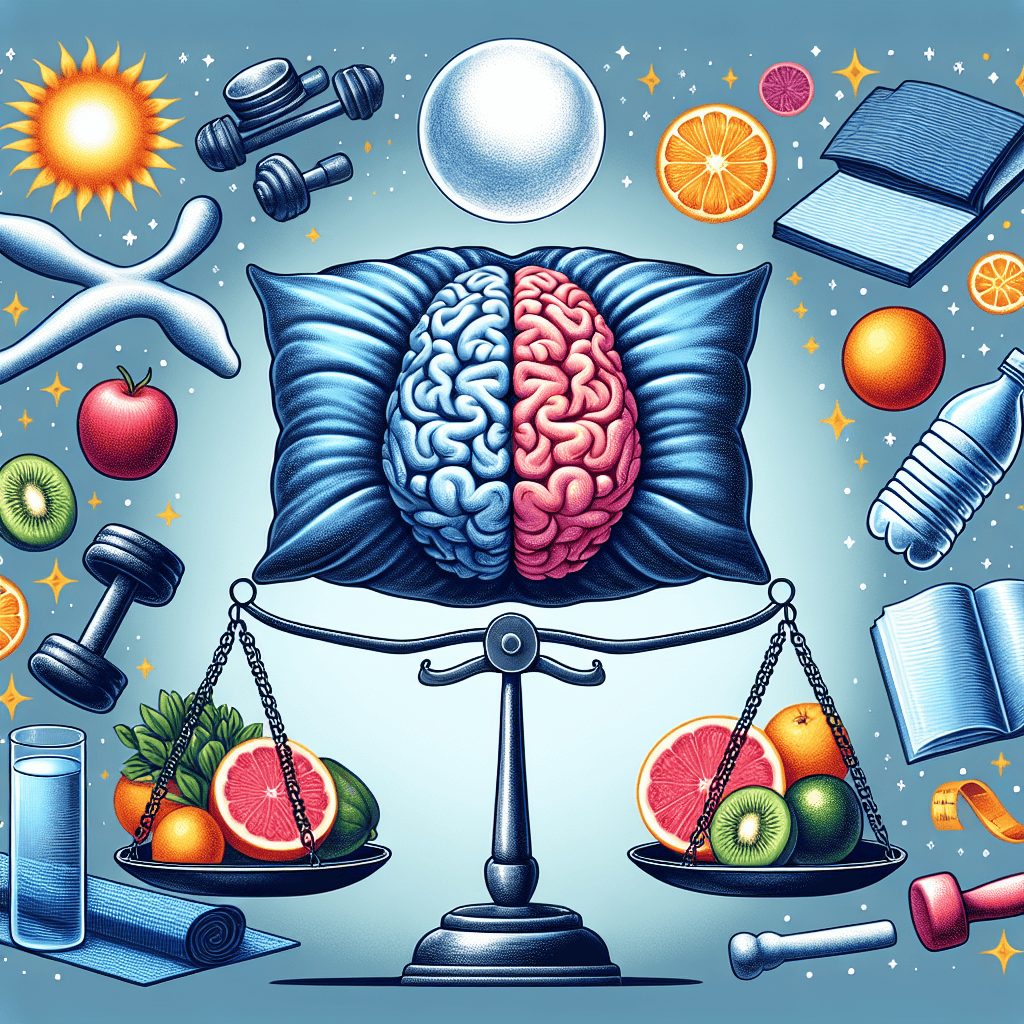-
Table of Contents
- The Importance of Sleep Health in Overall Wellness
- The Science of Sleep: Understanding the Basics
- The Stages of Sleep
- The Sleep Cycle
- The Impact of Sleep on Physical Health
- Cardiovascular Health
- Metabolic Health
- Immune Function
- The Role of Sleep in Mental Health
- Cognitive Function
- Emotional Regulation
- Mental Health Disorders
- Strategies for Improving Sleep Health
- Establishing a Sleep Routine
The Importance of Sleep Health in Overall Wellness

Sleep is a fundamental component of human health, yet it is often overlooked in discussions about wellness. In today’s fast-paced world, many people sacrifice sleep to meet the demands of work, family, and social obligations. However, the consequences of inadequate sleep can be severe, affecting both physical and mental health. This article explores the critical role of sleep in overall wellness, examining its impact on various aspects of health and providing insights into how individuals can improve their sleep habits for better well-being.
The Science of Sleep: Understanding the Basics
To appreciate the importance of sleep, it is essential to understand what happens during this vital process. Sleep is a complex biological state characterized by cycles of rapid eye movement (REM) and non-REM sleep. Each cycle plays a unique role in maintaining health and well-being.
The Stages of Sleep
Sleep is divided into several stages, each with distinct characteristics and functions:
- Stage 1 (NREM): This is the lightest stage of sleep, where the body begins to relax, and brain activity slows down. It serves as a transition between wakefulness and deeper sleep.
- Stage 2 (NREM): During this stage, heart rate and breathing slow further, and body temperature drops. It is a period of light sleep that prepares the body for deeper stages.
- Stage 3 (NREM): Also known as deep sleep or slow-wave sleep, this stage is crucial for physical recovery and growth. The body repairs tissues, builds bone and muscle, and strengthens the immune system.
- REM Sleep: This stage is characterized by rapid eye movements, increased brain activity, and vivid dreaming. REM sleep is essential for cognitive functions such as memory consolidation, learning, and emotional regulation.
The Sleep Cycle
A typical sleep cycle lasts about 90 minutes and repeats several times throughout the night. Each cycle includes periods of NREM and REM sleep, with the proportion of REM sleep increasing as the night progresses. Understanding these cycles helps explain why uninterrupted sleep is vital for optimal health.
The Impact of Sleep on Physical Health
Sleep is not merely a passive state of rest; it is an active process that supports numerous physiological functions. Adequate sleep is essential for maintaining physical health, and its deprivation can lead to a range of health issues.
Cardiovascular Health
Research has shown a strong link between sleep and cardiovascular health. During sleep, the body undergoes processes that help regulate blood pressure, heart rate, and inflammation. Chronic sleep deprivation can disrupt these processes, increasing the risk of cardiovascular diseases such as hypertension, heart attack, and stroke.
For example, a study published in the European Heart Journal found that individuals who consistently slept less than six hours per night had a 48% increased risk of developing or dying from heart disease. This highlights the importance of prioritizing sleep to protect heart health.
Metabolic Health
Sleep plays a crucial role in regulating metabolism and maintaining a healthy weight. Lack of sleep can disrupt the balance of hormones that control appetite, leading to increased hunger and cravings for high-calorie foods. This can contribute to weight gain and increase the risk of obesity and related conditions such as type 2 diabetes.
A study conducted by the University of Chicago found that sleep-deprived individuals had higher levels of ghrelin, a hormone that stimulates appetite, and lower levels of leptin, a hormone that signals fullness. This hormonal imbalance can make it challenging to maintain a healthy diet and weight.
Immune Function
Sleep is essential for a robust immune system. During sleep, the body produces cytokines, proteins that help fight infection and inflammation. Sleep deprivation can impair the production of these proteins, weakening the immune response and making individuals more susceptible to illnesses such as the common cold and flu.
In a study published in the journal Sleep, researchers found that individuals who slept less than seven hours per night were nearly three times more likely to develop a cold compared to those who slept eight hours or more. This underscores the importance of sleep in maintaining immune health.
The Role of Sleep in Mental Health
Sleep is not only vital for physical health but also plays a crucial role in mental well-being. Adequate sleep is essential for cognitive functions, emotional regulation, and overall mental health.
Cognitive Function
Sleep is critical for cognitive processes such as attention, memory, and problem-solving. During sleep, the brain consolidates memories and processes information from the day, enhancing learning and retention. Sleep deprivation can impair these cognitive functions, leading to difficulties in concentration, decision-making, and creativity.
For instance, a study published in the journal Nature found that sleep-deprived individuals performed worse on cognitive tasks and had reduced brain activity in areas associated with attention and working memory. This highlights the importance of sleep for optimal cognitive performance.
Emotional Regulation
Sleep is essential for emotional regulation and mental resilience. During REM sleep, the brain processes emotions and stress, helping individuals cope with daily challenges. Lack of sleep can lead to increased irritability, mood swings, and difficulty managing stress.
Research published in the journal Sleep Medicine Reviews found that sleep deprivation is associated with increased emotional reactivity and a higher risk of developing mood disorders such as depression and anxiety. This underscores the importance of sleep for emotional well-being.
Mental Health Disorders
Chronic sleep deprivation is a significant risk factor for mental health disorders. Insufficient sleep can exacerbate symptoms of existing conditions and increase the risk of developing new disorders. For example, individuals with insomnia are at a higher risk of developing depression and anxiety.
A study published in the journal JAMA Psychiatry found that treating insomnia with cognitive-behavioral therapy improved symptoms of depression and anxiety, highlighting the interconnectedness of sleep and mental health. Prioritizing sleep can be a valuable component of mental health treatment and prevention.
Strategies for Improving Sleep Health
Given the importance of sleep for overall wellness, it is crucial to adopt strategies that promote healthy sleep habits. By making sleep a priority, individuals can improve their physical and mental health and enhance their quality of life.
Establishing a Sleep Routine
One of the most effective ways to improve sleep health is to establish a consistent sleep routine. Going to bed and waking up at the same time each day helps regulate the body’s internal clock, making it easier to fall asleep and wake up naturally.
Creating a relaxing bedtime routine can also signal to the body that it is time to wind down. Activities such as reading, taking a warm bath, or practicing relaxation techniques can help prepare the





